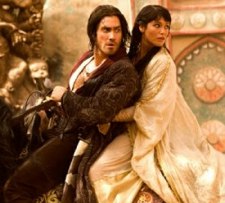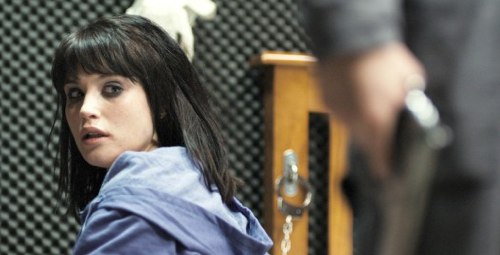Gemma Arterton on Alice Creed, Blockbuster Fatigue and the Politics of Being Tied Up
You're more than naked, though. You're naked and tied up. That's... weird!
Yeah, but you know, it was so relevant. It was completely necessary. We needed to see her petrified. She thinks she's going to be raped. She thinks she's going to die. She thinks that! And she's completely humiliated. So when the tables turn, you f*cking know why, and you're on her side. In Toronto, this got a huge cheer when [SPOILER REDACTED]. People were like, "Yes! F*ck!" So for me it was just similar to having to kiss an actor you're not in love with in a scene. "Oh, I've got to do that scene. I'm not really into that..." But you just do it. That was the feeling for me. I didn't want to make a big deal out of it. And also, I was really worried about the acting side more than anything else. That was kind of the easy bit, you know? I think everybody else was really nervous about it.
But to what extent is your presence as a bound, gagged and masked captor on a bed actually acting? We see you, in essence, as a physical prop for a good portion of this film -- but obviously you're still Alice.
I really took this job as an acting lesson -- the whole thing. When we were doing all of that, they'd be in the scene. Eventually we'd come to my bit of the scene. Just say I was there, laying in the bed. And they're doing the scene, or they're tying me up or whatever, I'd try to feel how I would feel in that situation. I would try to act that out even though you couldn't see it. It was exhausting. Because then, when the thing comes off my head and I have a confrontation with somebody, it all informs the next scene. Especially because we shot in sequence. It felt like we were doing a play. It felt like everything I did was important.
[BEGIN MILD SPOILER]
There was one scene we did called the mummification scene: I was sedated -- not really sedated -- and they taped me up, and I felt like I was suffocating. I had the ball gag in. I couldn't see. I couldn't move. Then they wrapped me up in a sheet and they carried me out. It was horrible. That, to me, was the most horrible bit of the shoot. I just felt like I couldn't breathe and I had no control.
[END MILD SPOILER]
Why did you do it?
Well, first of all it was one shot. So J said to me, "I want to do this overhead in one shot; it's got to be you." I said, "OK... that's fine. I'm sure it will be fine." But it wasn't fine. It was horrible. So then they cut me out, and they say, "Are you OK?" And I said, "No, not really." "Well, can we do it one more time?" "Well, all right, then." So we did it, and then the next time I did it I just tried to calm myself down. I just thought, "I'm fine. If anything happens, I'm fine." And I hate this, because I'm not this type of actor, but it really informed the performance: this feeling, this physical feeling. And I knew was in a safe environment as well, and that it wasn't going to get out of control. And I knew that I was the most powerful person on set in that moments because if I wanted to make it stop, it would stop.
That's why I did say I wanted to be tied up at certain times because I wanted to feel that claustrophobia and restriction. The physical feeling will inform the emotion. Sometimes, when I'm preparing for a scene, I'll change my breathing; changing your breathing changes how you feel. So the physical was very important. It really took a lot out of me. After the shoot my agent told me, "I think you'd better be more careful about which roles you choose, because you always end up really affected by them." I never really thought about that, but I do. I do.
 Even the roles in blockbusters?
Even the roles in blockbusters?
No, not those.
How do you prepare physically and/or emotionally for those scenes or those characters?
You really have to dig deep for those roles -- especially fantasy roles -- because there's not much that you can draw from in your own life experience and reality. Having now been in movies like that... I mean, I used to think, "Oh, movies like that are a piece of piss, really easy." They're not. They're the f*cking hardest work you're going to do because you've got to make the script sound alive. And they're usually quite bad scripts. So you work really hard to keep your creativity up over a long period of time, whereas with Alice Creed it was four weeks and we were out. We were constantly going.
But for six months you've got to keep imagining and keep dreaming that you're in love with that character and believe in the world. I always say credit goes to people who are actually good in those movies and make them somewhat believable. It's really hard. Even when you see really amazing actors who are paying their mortgage or whatever, they aren't great in the movie, you wonder, "How can that be?" Well, because the material's not good enough, and so there's not much you can do. So when you get given something like this where the material's fantastic, you don't really have to work as hard in a way. It's easier to access things. They're more human. It was refreshing for me to do this for that reason.
Pages: 1 2


Comments
"Alice Creed" is awesome, awesome, awesome. Saw it a few months ago in London. A very unique and highly recommended little thriller. Arterton is amazing in it, too.